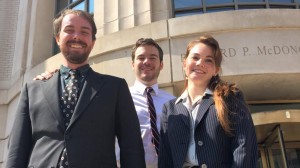OXFORD, Miss. – The University of Mississippi School of Law has won its second national moot court championship for 2015, this time in the Manfred Lachs Space Law Moot Court at Georgetown University Law Center in Washington, D.C.
Technically, Ole Miss earned the title of North American Champion and with it, the right to represent the continent at the world finals in Jerusalem in October.
“A success like this, in the world’s oldest and most prestigious space law competition, stands out as a highlight on a student’s resume,” Dean Richard Gershon said. “As an international leader in this unique emerging area of law, Ole Miss helps propel students into careers at government agencies like NASA and the CIA, as well as position students for opportunities in the growing private space industry and at companies like Bigelow Aerospace and SpaceX.”
This victory, on March 21, builds on a string of successes for the law school’s advocacy programs, which include winning the nation’s pre-eminent environmental law moot court competition for the fourth time in five years, winning four national championships in 2014, earning a top 14 national ranking for the school’s moot court board in 2014, receiving second place at the National Sports Law Negotiation Competition last fall and achieving a top 8 finish at the moot court National Championship in January at the University of Houston Law Center.
As North American space law champions, the Ole Miss team will compete in the world finals against schools from Africa, Europe and Asia-Pacific. Three members of the International Court of Justice will serve as judges and hear arguments in a hypothetical case involving an asteroid mining dispute and liability for a failed attempt to divert an asteroid from colliding with Earth. In its 24th year, the competition takes place under the auspices of the International Institute of Space Law, headquartered in Paris, and attracts more than 60 law schools from around the globe.
On the road to the championship, the UM law school triumphed over a field that included teams from Georgetown, Nebraska, Hawaii, Temple, St. Thomas, Florida State, University of California at Davis, Arizona State, George Washington University, McGill (in Montreal) and Universidad Sergio Arboleda (Bogota, Columbia).
While all these law schools focus on international law, Ole Miss stands out as one of just a few to offer a program devoted to the law governing aviation, space exploration and satellites. In fact, the School of Law pioneered the field of space law over 45 years ago and the New York Times has recognized it as “an international center for space law studies.” The school’s expertise is embodied in its Journal of Space Law, the conferences it hosts, the service of its graduates in the field and in its curricular programs.
Notably, the School of Law features both a J.D.-level certificate program on remote sensing, air and space law, and an advanced LL.M. degree in air and space law. Indeed, Ole Miss offers the only advanced law degree program in the United States combining both aviation law and space law. For more information on these programs, visit http://law.olemiss.edu/academics-programs/llm/ and http://law.olemiss.edu/academics-programs/certificate-programs/remote-sensing-air-space-law-certificate/
The UM championship team includes Olivia Hoff of Gulfport and C.J. Robison from Lubbock, Texas, both second-year law students in the space law certificate program. Joining them is Ian Perry of Ellis County, Texas, a 2013 J.D. recipient who is working on his space law LL.M.
“I believe a great deal of our success stems from our knowledge of general international law and space law,” Robison said. “Ole Miss has some of the best resources and professors in the country for such study. Our success is definitely a testament to the university’s leadership in this area.”
“I am extremely proud of these students,” said Jacquie Serrao, director of the LL.M. program. “I know they will represent North America and our law school brilliantly at the finals in October. C.J., Ian and Olivia are each examples of the caliber of space law scholars and future attorneys which the J.D. and LL.M. programs produce.”
For Hoff, a physics and mathematics graduate of the University of Southern Mississippi, the space law certificate program offered a path to become a lawyer while staying focused on the sciences. “To some degree, pursuing the certificate makes me feel as if, even though I changed fields, I am still staying true to my roots.”
The team is coached by Michael Dodge, who graduated from the UM space law program in 2008 and teaches U.S. and international space law at Ole Miss. Joining Dodge as assistant coach is Michael Mineiro, an adjunct professor who holds a J.D. from North Carolina along with an LL.M. and D.C.L. from McGill University, and works on space law issues for numerous federal agencies and international organizations.
“I am tremendously proud of the team’s achievement,” Dodge said. “In the upcoming months, I look forward to working to prepare them for the next stage of the competition. I know they will compete admirably, and skillfully represent the University of Mississippi and its long association with space law.”
Dodge also praised the student body of the space law program and the school’s placement efforts.
“Our professors have decades of contacts in academia, government and private industry,” he said. “Accordingly, many of our graduates have gone on to realize their dreams, working for such diverse employers as NASA, the FAA, the National Oceanic and Atmospheric Administration, congressional offices, Bigelow Aerospace, Spaceport America, consulting firms, higher education and, of course, private law firms.”
